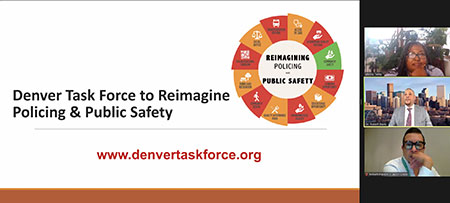For its 11th annual Day of Action, APHA’s Community Health Planning and Policy Development Section convened public health and Denver-area advocates to redefine safety in their communities.
While attendees tuned in to the virtual event from all over, CHPPD partnered with the Colorado Public Health Association to ensure that the gathering maintained its goals of supporting, showcasing and learning from local activists working in the Annual Meeting’s host city.
 Beginning with a tour of downtown Denver, event organizers asked attendees to confront how the policy and design of the city is at odds with factors that typically protect and uplift residents’ health.
Beginning with a tour of downtown Denver, event organizers asked attendees to confront how the policy and design of the city is at odds with factors that typically protect and uplift residents’ health.
Jason Vitello, behavioral health coordinator at CPHA, said we’re living in a time that will confound future generations — that “our grandchildren will look at us and say, ‘y’all did what?’”
“You criminalized the most vulnerable people in our society? Those with mental illness, the unhoused, people who are victims of systemic racism,” he said.
The event featured three local organizations:
The Day of Action urged participants to follow the example and support the nearly 120 policy recommendations proposed by the Denver task force, a team of over 40 community organizations that are trying to redefine what public safety means in Denver.
In its report, the task force redefines public safety as ensuring “that all members of the community decide how to organize a social environment that provides the freedom to live and thrive with the protection and support of social, physical, mental and economic well-being. Safety is not a function of armed paramilitary forces with a proven track record of racism and violence. Public safety prevents, reduces, and heals harm.”
Working with local political leaders and even local police, the Denver task force has reported early success at energizing residents and keeping stakeholders – even those thought to be at odds the task force’s mission – at the table. For example, earlier this year, Denver Public Safety Director Murphy Robinson formally withdrew from the task force due to disagreements over law enforcement’s role in the task force process. The agency re-entered discussions after the 112 recommendations were published, said Robert Davis, project coordinator for the task force.
“We invited police to be advisers and consultants – they have insights,” Davis said. “But we had to make sure that community voices were elevated, too. Those in power already have a huge platform – we had to raise the voices on our platform.”
Photo by Aaron Warnick, courtesy The Nation's Health